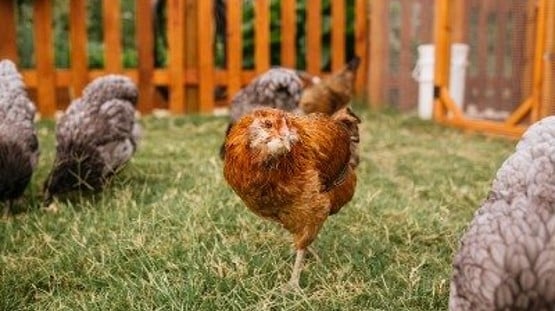
A strain of highly pathogenic avian influenza has been found in two commercial poultry flocks in Rockingham County, and officials are urging Virginia bird owners to stay vigilant against the virus.
The Virginia Department of Agriculture and Consumer Services and state officials have quarantined the affected areas and are performing additional testing and monitoring in a 6.2-mile radius around the impacted flocks.
As a result of the recent cases, officials are ramping up biosecurity measures on poultry farms and encouraging backyard poultry owners to do the same.
“This virus strain is spread predominantly by wild birds,” said Tony Banks, senior assistant director of agriculture, development and innovation for Virginia Farm Bureau Federation. “To the extent possible, backyard flock owners should do everything they can to prevent their poultry’s direct contact with all wild birds, predators and rodents.”
Backyard poultry owners can help mitigate exposure by repairing any holes in fencing, structures, screens and roosting areas that may attract wild birds and animals.
Additionally, they should limit visitor contact, wear personal protective equipment, change clothes before and after entering poultry areas, disinfect tools and equipment, and provide disposable boot covers or disinfectant footbaths for anyone in contact with poultry.
The U.S. Department of Agriculture estimates that at least 85 percent of HPAI cases in U.S. poultry flocks can be attributed to exposure to wild birds carrying the virus. The airborne respiratory virus is transmitted through nasal and eye secretions and manure, and can be spread between domestic and wild birds, flock to flock, through equipment and on clothing and shoes.
The Centers for Disease Control and Prevention considers the risk to the public from HPAI infections low. Proper handling of eggs and poultry and cooking them to an internal temperature of 165 degrees kills bacteria and viruses, including HPAI.
“It is a serious threat to poultry farms and owners of backyard flocks,” Banks said.
The virus leads to high mortality in domestic poultry and potential depopulation of commercial flocks.
Though these are the first cases found in commercial poultry flocks in Virginia, VDACS reports that HPAI has been detected in six non-commercial backyard flocks since the outbreak began in January 2022. Other cases have been found in hunter-harvested wild waterfowl.
Virginia bird owners should report poultry illnesses or unusual deaths to the state veterinarian’s office at (804) 692-0601 or [email protected].
Learn more flock biosecurity tips at the USDA’s Defend the Flock Resource Center online.
Related stories
Sen. Warner joins lawmakers in USDA push to alleviate avian flu outbreaks with federal funding
Spanberger: ‘Exorbitant’ egg prices, avian flu need to be focal points for USDA
First case of avian flu reported in Virginia; experts say risk to humans is low
Backyard bird owners should protect their flocks from avian influenza, or HPAI
Consumers going cold turkey this Thanksgiving? Probably not, despite record high prices
Talkin’ turkey: Is there going to be a shortage of turkeys at Thanksgiving this year?










